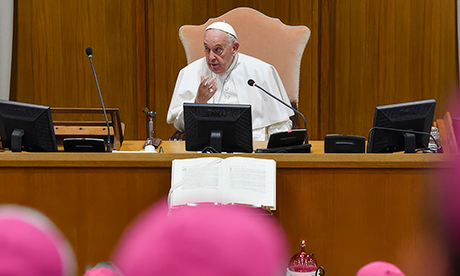The full ambivalence of Pope Francis’ pastoral approach to the issue of homosexuality has come into view, first during his television interview with CBS News’ Norah O’Donnell, and now with the news that he told the Italian bishops’ conference that gay men should not be allowed to enter the seminary.
Is this the same pope who, early in his pontificate, when asked about a gay clergyman who keeps his vows, asked rhetorically, “Who am I to judge?”
Yes, it is.
Part of the confusion about the decision to permit blessings of gay people who are in a relationship stems from the Vatican’s own press coverage of the document Fiducia Supplicans when it was promulgated last December.
Vatican News produced the headline: “Doctrinal declaration opens the possibility of blessing couples in irregular situations.” Couples, not individuals.
When reading the English translation of the document, it clearly states, at Paragraph 11:
… it is necessary that what is blessed corresponds with God’s designs written in creation and fully revealed by Christ the Lord.
For this reason, since the Church has always considered only those sexual relations that are lived out within marriage to be morally licit, the Church does not have the power to confer its liturgical blessing when that would somehow offer a form of moral legitimacy to a union that presumes to be a marriage or to an extra-marital sexual practice.
But the very next paragraph sets the stage for the pastoral application of the doctrinal principle, stating, “One must also avoid the risk of reducing the meaning of blessings to this point of view alone. …
“Indeed, there is the danger that a pastoral gesture that is so beloved and widespread will be subjected to too many moral prerequisites, which, under the claim of control, could overshadow the unconditional power of God’s love that forms the basis for the gesture of blessing.”
This was the heart of the document: God’s unconditional love “forms the basis for the gesture of blessing.”
The pope was indicating that a pastor, charged with helping all persons develop and deepen their relationship with God, can impart a blessing on persons whose situation is, in the eyes of the church, irregular.
“The shift Francis intends is, at once, less exact and more profound than a doctrinal shift,” I wrote at the time. “What Francis has been trying to achieve for many years is to relocate the place of doctrine within the magisterium of the church, specifically to insist that doctrine serve the good of souls, not the other way round.”
The issue of gay seminarians is entirely different from that of blessing gay unions: No doctrinal issues are involved.
So long as a seminarian is celibate, and has maturely integrated his celibacy into his life, it should not matter if he is straight or gay.
We do not have a transcript of what the pope said to the Italian bishops and, especially, what question prompted him to say what he did.
There have been instances of seminaries with a gay subculture that was destructive of the formation the seminary existed to impart.
The fact that the pope may have used a vulgar Italian word, frociaggine — translated as “queerness” in most media accounts but I suspect “campiness” is closer to what was meant — when discussing the subject suggests he might have had in mind precisely such a situation.
The pope has now apologised for using the term.
The idea that the pope has suddenly revealed his hidden bigotry towards gay persons, which seems to be the consensus on social media, is ridiculous.
Nothing about this man or his papacy suggests he is bigoted towards anyone.
Whence, then, this ambivalence in the pope’s statements?
How did he go from “Who am I to judge?” to this?
It has to do with the inherent conflict of his position as pope.
He is the universal pastor of the church and he is the defender of Christian doctrine.
He wants to help people grow closer to God, and knows that accompanying them, not judging them, is the best way to achieve that. He also believes what the church teaches.
It is this last point that the activists on both sides forget. Continue reading
- Michael Sean Winters is the author of Left At the Altar: How Democrats Lost The Catholics And How Catholics Can Save The Democrats (Basic Books, 2008).
News category: Analysis and Comment.




